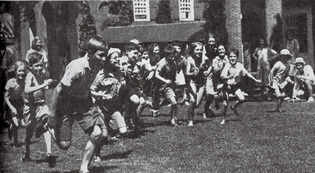 loading
loading
Old YaleYale's foster children Manuscripts & ArchivesThe arrival of the children of Oxford and Cambridge faculty was a local media event. This photo is from the New Haven Register. View full image
Seventy years ago, in July 1940, the winds of what was then known as the European War brought 126 evacuated British children and mothers to New Haven. This was almost a year and a half before Pearl Harbor, when Americans (including various factions of Yale students) were still debating their commitment to neutrality or intervention. But the newly formed Yale Faculty Committee for Receiving Oxford and Cambridge Children showed its sympathies by offering young British citizens a safe haven for the duration of the war. Yale’s committee worked in coordination with the United States Committee for the Care of European Children, whose honorary president was Eleanor Roosevelt. She quickly cut through the red tape, enlisting the Immigration and Naturalization Service to modify visa requirements and the Children’s Bureau to coordinate and monitor the casework of state departments and private agencies. Yale’s evacuees sailed to Canada, where they were put on a special train to New Haven. “Oxford Children Reach Yale,” read a New York Times headline on July 24. “They Praise New England Scenery … and Find Our Ice Cream Greatly to Their Liking.” The oldest child was 15, the Times noted, and the youngest just three weeks old. Once in New Haven, they were bused to temporary quarters, some at the Yale Divinity School and some at the Children’s Center in nearby Hamden. (On arrival, said the Times, a few children “promptly started squirting a garden hose at one another until stopped by their elders.”) The mothers and children spent three weeks in their interim housing, waiting for the move into foster homes or the homes of friends and relatives. Only some two dozen mothers were in the group, so Americans served in loco parentis for most of the youngsters. The majority of the Yale hosts were faculty. Among them were the eminent English professor Maynard Mack; Robert Dudley French, master of Jonathan Edwards College; and Edith Jackson, a pioneer of psychoanalysis and child psychology. Each mother and child had been allowed to bring only £10 out of England, but there was no lack of funds: the evacuees’ families, as well as U.S. individuals and two foundations, contributed more than a hundred thousand dollars. Yale’s group was one of the largest. By October 1942, it had grown to 28 mothers and 117 children, thanks to a few additional evacuees—and three babies born in New Haven. The U.S. Committee planned to evacuate thousands of British children; under its auspices, 861 arrived in the United States between June and August of 1940. But in August, a German submarine torpedoed an evacuee ship sailing for Canada, and 77 children died. The tragedy ended the official program. Private arrangements, however, brought many more children to Canada and the United States; the estimates range from 1,600 to 10,000 additional evacuees. The majority of the children in New Haven attended private schools, mostly on scholarship. After completing high school, two students entered Oxford, two entered Mount Holyoke, and two—Stephen Handfield-Jones and John Marchant—entered Yale as part of the Class of 1945W. (In his 1960 reunion book, Marchant wrote that he still kept in touch with Mrs. Robert D. French, his foster mother for three years and a “beloved friend.”) A few of the children sent to other U.S. cities also ended up with Yale connections: one boy played on the soccer team captained by George H. W. Bush ’48 at Andover; another, at Millbrook, roomed with William F. Buckley Jr. ’50. As the children grew older, some teens and mothers returned to England for war work. By September 1944, the committee reported that “the stream of repatriation has grown from a trickle to a sizable flow.” The Oxford and Cambridge parents sent many appreciative letters to the host “parents” and the Yale Committee. For some children, repatriation was a slow process. One mother wrote: “At the moment he talks about ‘at home’ referring to this house and yours equally, he calls us both mother impartially and sometimes calls me by your name. So that it seems as if he is finding it possible to slide from one background to another without being conscious of any violent change. The one thing which he admits to missing is the ‘comics,’ but he just loves to talk about America to anyone who will listen.” One parent perhaps summed up the feelings of all: “The happy way the returnees are settling down, even if there is a short period of querulousness, greatly removes parental anxiety. They miss everything in America, their friends, schools, and their sports, but they realize that they have come back to their own, where they belong.”
The comment period has expired.
|
|